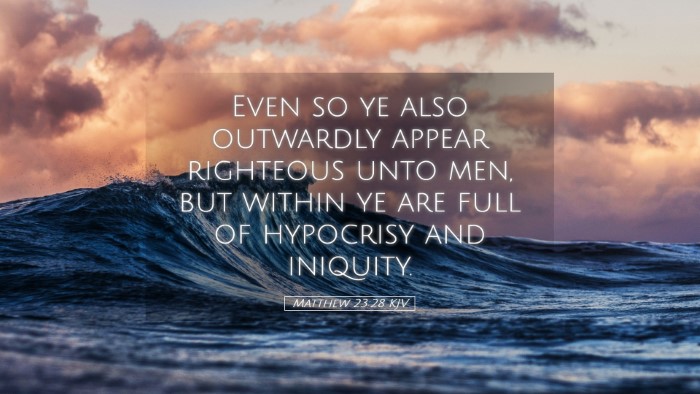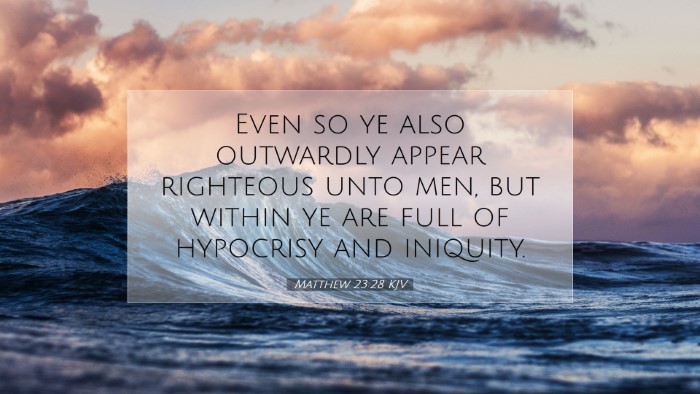Commentary on Matthew 23:28
Matthew 23:28 states: "Even so you also outwardly appear righteous to men, but inwardly you are full of hypocrisy and lawlessness." This verse serves as a sharp critique of the religious leaders of Jesus' time, particularly the Pharisees, who, while outwardly conforming to the laws and traditions, were corrupt in their hearts and actions.
General Observations
This verse encapsulates the essence of Jesus’ condemnation of hypocritical religious behavior. It underscores a profound biblical principle: that true righteousness must originate from the heart, not merely from outward appearances. This is pivotal for a comprehensive understanding of Christian faith and practice.
Insights from Matthew Henry
Matthew Henry emphasizes the notion of the visibility versus the reality of faith. He asserts that appearing righteous before men does not equate to being righteous in the eyes of God. Henry notes that:
- The term "appear righteous" indicates a façade; a sort of religious masquerade that deceives the human eye but cannot fool God.
- He highlights that the hypocrisy prevalent among the Pharisees was not merely a struggle with sin, but a deliberate and systematic concealment of their true nature.
- According to Henry, such hypocrisy leads to lawlessness, as one cannot be genuinely righteous when their foundational principles are rooted in deceit.
Reflections from Albert Barnes
Albert Barnes expands on the implications of this verse, pointing out that:
- Barnes indicates that "hypocrisy" is akin to an actor playing a role—a disconnection between inner virtue and outer conduct.
- He observes that spiritual leaders should model true piety, yet the Pharisees were notorious for their external displays which masked their moral and ethical derailment.
- Barnes further notes that the term "lawlessness" here emphasizes rebellion against God's true laws, suggesting that those who appear righteous but practice deceit are, in reality, working against God’s intentions and teachings.
Analysis by Adam Clarke
Adam Clarke provides further layers of meaning, elucidating that:
- Clarke interprets the terms used in the verse: "hypocrisy" denotes a conscious and willful act of deceit that seeks to achieve a certain social standing while disregarding spiritual integrity.
- He points out that this condemnation serves as a warning to all believers today; the danger of being more concerned with human perception than with divine authenticity.
- Clarke stresses that Jesus’ teachings are about internal transformation rather than mere external conformity; the need for a heart change that reorients one's motives and actions toward God’s will.
Theological Implications
The verse has several profound theological implications:
- Inner Transformation: True Christianity emphasizes regeneration—a change that affects the core of one’s being. Righteousness must emanate from a heart that is transformed by the Holy Spirit.
- Authenticity in Faith: Spiritual leaders and laypersons alike are called to authenticity, living out their faith genuinely rather than attempting to uphold a false image.
- Judgment and Accountability: The verse also indicates that appearances are deceiving; God sees the heart. There will be a divine reckoning for those who practice hypocrisy.
Personal Application
For pastors, theologians, and students of the Bible today, Matthew 23:28 invites reflection on the following:
- Are we more concerned with how we are perceived by others than with our true relationship with God?
- In what ways can we ensure that our outward expressions of faith truly reflect an inner authenticity?
- How can the church promote a culture of vulnerability and truth instead of pretense and performance?
Conclusion
Matthew 23:28 remains eternally relevant, urging believers to strive for integrity between outward actions and inward motives. The insights gathered from public domain commentaries provide a rich tapestry for understanding this critical warning from Jesus, calling all who read to consider the state of their own hearts as they engage in their spiritual walks.


